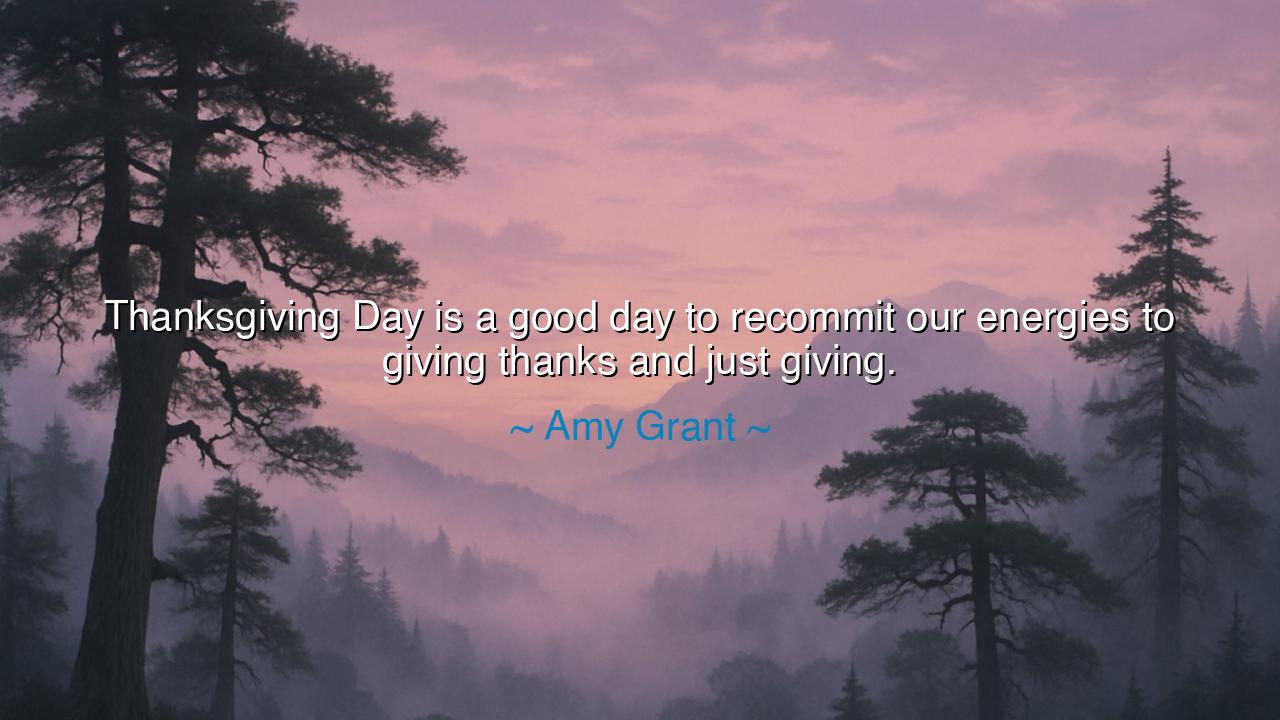
Thanksgiving Day is a good day to recommit our energies to
Thanksgiving Day is a good day to recommit our energies to giving thanks and just giving.






The words of Amy Grant, “Thanksgiving Day is a good day to recommit our energies to giving thanks and just giving,” resound with a call both simple and profound. They remind us that this sacred day is not only a celebration of harvest and abundance, but also a time of renewal, when hearts must once again turn toward gratitude and generosity. For it is all too easy to let the fire of thankfulness grow dim, or for the will to give to falter amidst the demands of life. Thus, the day of Thanksgiving becomes more than a holiday—it becomes a summons to restore our highest values.
The origin of this wisdom springs from the dual meaning of the word itself: thanks and giving. One without the other is incomplete. To give thanks without extending generosity risks becoming self-contained and hollow. To give without gratitude may be reduced to mere obligation. But when the two are bound together, they create a cycle of blessing: the heart swells with thankfulness for what it has, and from that fullness flows the desire to give. Amy Grant, known for her songs of faith and compassion, captured this eternal rhythm with her reminder that Thanksgiving is not the end of giving, but the moment to recommit to it.
History bears witness to this truth. During the dark days of the Great Depression, families across America had little to celebrate. Yet, countless stories are told of households who, despite their meager means, opened their doors to neighbors, strangers, and wanderers seeking food. In one such story, a family with only bread and soup welcomed a hungry traveler to their table. Though their meal was simple, their act of generosity turned poverty into abundance. This is the living example of Amy Grant’s teaching: gratitude and giving are magnified when hardship sharpens their meaning.
Consider also the life of Mother Teresa, who spent her days among the poorest of Calcutta. She often spoke of giving not from surplus, but from sacrifice. She reminded the world that true giving comes not when it is easy, but when it costs something of oneself—time, comfort, or pride. In her acts, we see the essence of Thanksgiving lived daily: an offering of gratitude for life itself, and a willingness to pour oneself out for the sake of others. Such examples shine as living parables for our own time.
The meaning of this quote is therefore both inward and outward. Inward, it asks us to pause and stir up gratitude for the blessings—seen and unseen—that sustain us. Outward, it calls us to translate that gratitude into action: to share, to uplift, to relieve the burdens of others. Without such recommitment, Thanksgiving risks becoming a momentary indulgence. With it, the day transforms into a covenant, a vow to live the spirit of gratitude and generosity in every season.
The lesson for us is clear: do not let Thanksgiving be only about the food or the gathering. Let it be the altar upon which you place your pledge to live more generously. After the day has passed, carry its spirit forward—write a note of thanks, visit someone who is lonely, give of your resources to those in need, or offer your time where it is most scarce. In this way, you honor the teaching of Grant’s words, transforming a single day into a lifelong practice.
Practical actions lie within reach of every soul. Begin each Thanksgiving morning with a spoken prayer of thanks, naming the blessings that have upheld you. As the day unfolds, seek out opportunities not only to share your table but also your kindness—invite the forgotten, reconcile with those estranged, or give to a cause that heals the world. And when the sun sets, let the fire of generosity remain kindled, so that the next day and the day after may still bear the light of Thanksgiving.
Thus, let Amy Grant’s voice echo in your heart: Thanksgiving Day is a good day to recommit our energies to giving thanks and just giving. May these words be as a torch passed down to generations, reminding them that gratitude is not passive, nor generosity occasional. They are active forces, to be renewed and lived daily. And in this renewal, the world is made kinder, brighter, and more whole.






AAdministratorAdministrator
Welcome, honored guests. Please leave a comment, we will respond soon